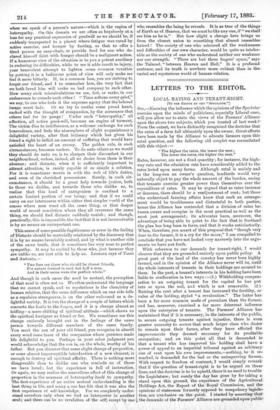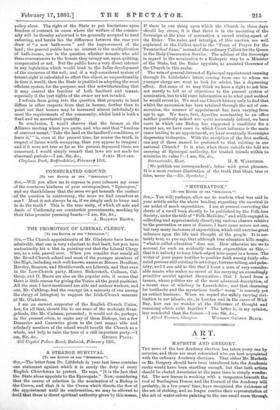LETTERS TO THE EDITOR.
LOCAL RATING AND TENANT-RIGHT.
(TO THZ &MOE OF TEE " SFECTITOR."]
Sin,—Knowing the influence which the opinions of the Spectator- exercise upon the minds of politicians, especially Liberal ones,.
will you allow use to state the views of the Farmers' Alliance upon the above two subjects, which you treated of last week P. From the outset, we have distinctly recognised the doctrine that the rates of a farm fall ultimately upon the owner. Great efforts, have been made by the Alliance to educate farmers upon this ratal question, and the following old couplet was resuscitated with this object :—
" The higher the rates, the lower the rent ;
The lower the rates, the higher the rent."
Rates, however, are not a fixed quantity ; for instance, the high-- way rate and the edudation rate have considerably added to the rates levied upon many farms. Although ratal is mainly and in the long-run an owner's question, landlords would very naturally object to pay the whole amount of the burden, seeing.
that tenants exercise greater power than themselves over the-
expenditure of rates. It may be argued that as rates increase- or decrease, there should be a readjustment of rent ; but those
who understand farming affairs know that such an arrange- ment would be troublesome and distasteful to both parties,. hence the Alliance has contended that a division of rates be- tween owner and occupier is the most practical as well as the most just arrangement; its advocates have, moreover, the advantage of being able to point to the fact that in Scotland; the plan has long been in force, and that it works satisfactorily._ When, therefore, you assert of this proposal that "though very dear to the farmer, it is a cry for the moon," I am compelled to- conclude that you have not looked very narrowly into the argu- ments we have put forth.
With reference to our demands for tenant-right, I would- observe that they are grounded entirely upon public policy. A great part of the land of the country has never been highly
farmed, and in the opinion of the Alliance never will be, until the whole interests of tenants• in their holdings are secured to them. In the past, a tenant's interests in his holding have been- liable to confiscation in two ways :—(l..) Withholding compen- sation to an outgoing tenant for the capital he has put into or upon the soil, and which is not removable. (2.) - Raising the rent after a tenant has increased the fertility, or- value of the holding, styled "a revaluation." The latter has been a far more common mode of procedure than the former,.
and has, moreover, exercised a far more deterrent influence upon the enterprise of tenants. The Farmers' Alliance has maintained that if it is necessary, in the interests of the public, to secure outgoing tenants against injustice, there is even greater necessity to secure that much larger class who desire to remain upon their farms, after they have effected the improvements they deemed necessary for its profitable- occupation ; and on this point all that is demanded is.
that a tenant who has improved his holding shall have a power of appeal to an impartial tribunal against an arbitrary rise of rent upon his own improvements,—nothing, be it re- marked, is demanded for the bad or the unimproving farmer. With respect to freedom of contract, I would simply remark.
that if the question of tenant-right is to be argued on these- lines, and the doctrine is to be upheld, there is no need to trouble the Legislature; but surely the day has gone by for taking a stand upon this ground, the experience of the Agricultural Holdings Act, the Report of the Royal Commission, and the- opinions of statesmen formerly opposed to compulsory legisla-
tion, are conclusive on the point. I started by asserting that- the demands of the Farmers' Alliance are grounded upon public-
policy alone. The right of the State to put limitations upon freedom of contract in cases where the welfare of the commu- nity will be thereby subserved is too generally accepted to need enforcing, and herein lies the difference between the ease you draw of "a new bath-room" and the improvement of the land ; the general public have no interest in the multiplication of bath-rooms, nor in the question whether tenants who add these conveniences to the houses they occupy are, upon quitting, compensated or not. But the public have a very direct interest in any legislation which would tend to the fuller development of the resources of the soil ; and if a well-considered system of tenant-right is calculated to effect this object, as unquestionably in time it would, then the State is justified in adopting the most efficient system for the purpose, and this notwithstanding that it may control the freedom of both landlord and tenant, -especially if the just rights of the owner are not invaded.
I refrain from going into the question that property in land -differs in other respects from that in houses, further than to ,point out that houses may be increased almost indefinitely to -meet the requirements of the community, whilst land is both a fixed and an ascertained quantity.
In conclusion, I would observe that the farmer at the Alliance meeting whom you quote, and who said that "freedom -of contract meant, 'Take the land on the landlord's conditions, or leave it,'" is, even at the present time, far nearer the truth, in respect of farms worth occupying, than you appear to imagine ; and if it were not true so far as the present depressed times are -concerned, I would simply remark that laws are not made for















































 Previous page
Previous page